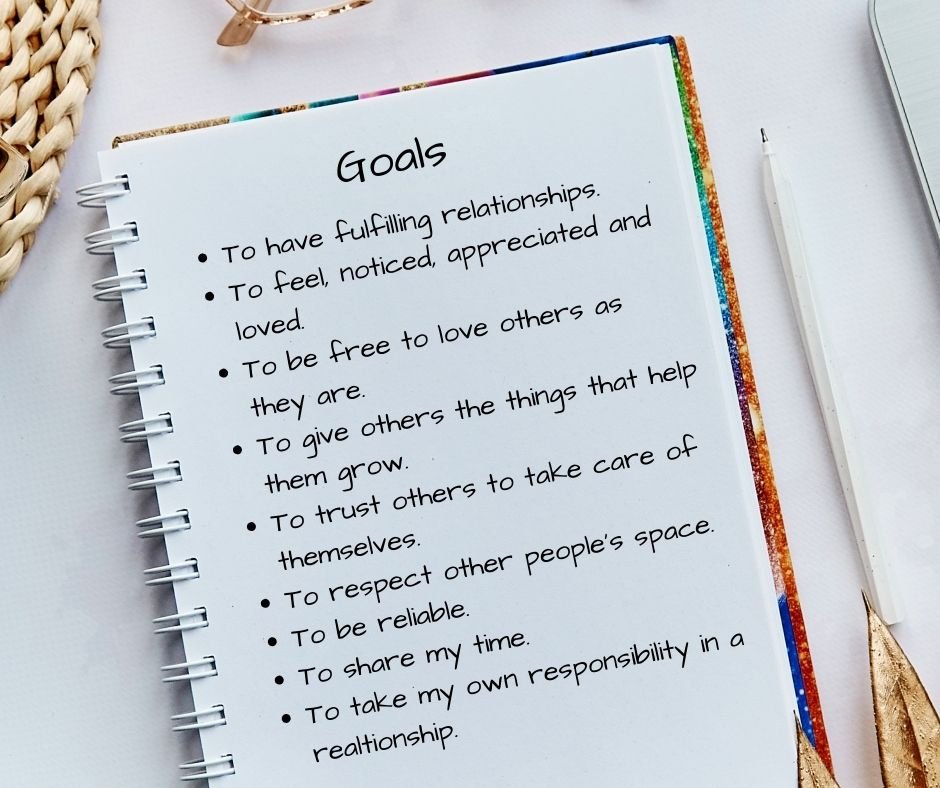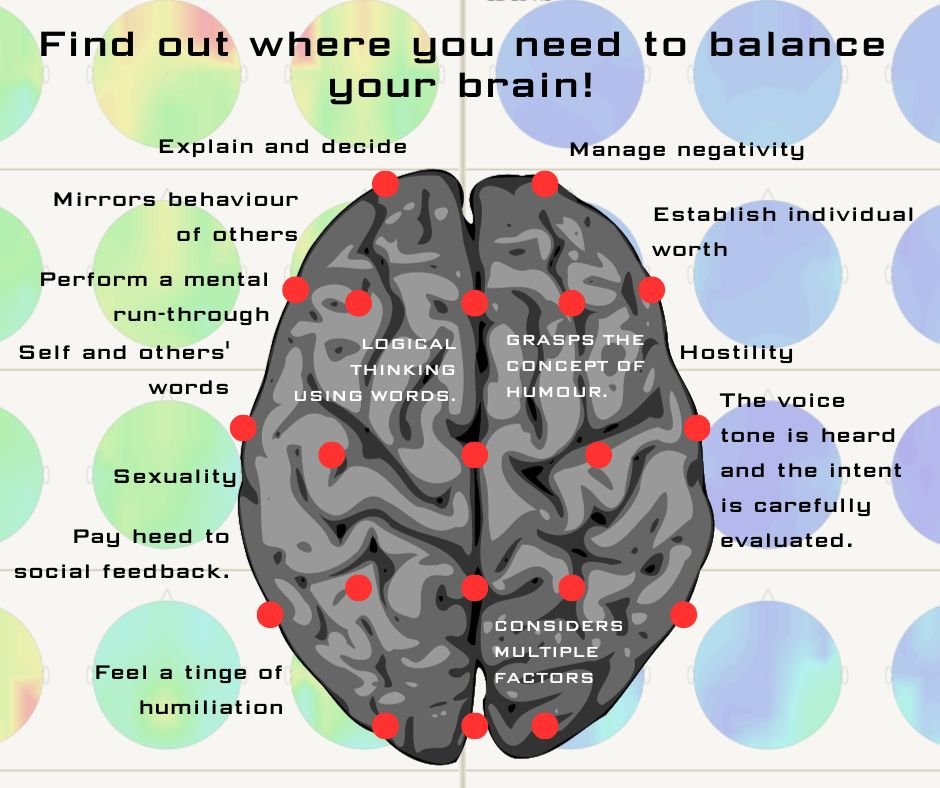While it may be tempting to give up on humanity and escape to our own island, we can’t. Being around others is essential for our personal growth. We need feedback from the world and the people around us in order to thrive. People serve as our mirrors, helping us become better versions of ourselves. As iron sharpens iron, we learn and grow through our interactions with others.


Connection is a need!
According to Maslow’s hierarchy of needs, once we feel safe, our next goal is to connect and find a sense of belonging. However, relationships can be challenging. In the beginning, our partner is our escape, someone we can share our day and stresses with. They provide a non-emotional response and support. But as our lives merge, the stresses become shared as well. The person who used to be our escape is now part of the overwhelm.
How your brain organisation is setting you up for failure.
What if I told you that we could help you understand your personality and your partner’s, as well as how each of you organises your brain when stressed and what this means? I’ve had the privilege of conducting profile sessions with couples, siblings, parents, and children. While interpreting the results may not eliminate the stresses, they do offer a new way forward for individuals in these situations.
A couple I recently profiled gained a better understanding of each other’s behaviours. We initially looked at how each of their brains organised themselves when stressed. It was a significant breakthrough for them to realise that they had completely different approaches when under pressure. Meet Kate and Tim* (not their real names). The following is what they discovered about each other.
Being all about the emotions!
When Kate is stressed, she becomes very emotional and tends to express herself through storytelling rather than stating the facts. She also has a tendency to forget details. Kate finds it difficult to focus on what is being said instead of how it is being said. Additionally, she may act impulsively without considering the consequences. Kate is left with a sense of being overwhelmed and unheard in the midst of an argument, as she was unable to effectively convey her point in a manner that would truly resonate with others.
Being all about the facts!
On the other hand, Tim becomes more logical and tends to detach himself from his emotions. As a result, he struggles to understand Kate’s emotional reactions. He focuses solely on the facts and communicates directly, which can sometimes come across as harsh. Tim then plans his next steps based on logical reasoning. However, when he is stressed, he is unable to truly listen to what Kate is trying to communicate. Tim frequently experiences frustration during arguments because it proves to be exceedingly challenging to reach a logical compromise when attempting to rationalise abstract emotions. These differences in the couple’s stress responses make it difficult for them to see eye to eye unless they can calm down and have open, non-threatening conversations with each other.
How is your personality is getting in the way?
Kate’s personality is rooted in a strong desire for safety. Subconsciously, she constantly questions whether she is secure in all aspects of her life. In her relationship with Tim, she seeks reassurance of his unwavering commitment. Past experiences have made her doubt her safety within relationships, leading to concerns of being abandoned, rejected, or let down. When she feels unsafe, her instinctual response is to fight and defend herself.
On the other hand, Tim’s personality is driven by a need for harmony. He will make every effort to steer clear of conflict however, if pushed too far or if he feels a loss of control, he may become argumentative and confrontational.
Living in a household with an extended family can be challenging for Tim as he tries to maintain peace among everyone. This situation has caused him immense stress.
Is the problem your brain activity?
To gain a deeper understanding of certain behaviours, it could be beneficial to examine the brain activity of each individual. This way, we may be able to identify any imbalances in the brain that could be causing certain behaviours. Dr Daniel Amen is a psychiatrist who is known for doing exactly that.
Dr Daniel Amen is skilled in working with couples, utilising SPECT to examine the unique brain activity of each individual. His expertise lies in deciphering the significance of brain activity in various regions, which has proven immensely beneficial for numerous individuals. Through these scans, some individuals have discovered their difficulty in letting go of certain things or their inclination to provoke conflicts in order to stimulate their frontal lobe. In one case, a woman came to realise that her husband’s negative personality change, was due to chemicals he was using at work which was causing damage to parts of the brain. In a different scenario, a wife noticed a change in her husband’s behaviour after he experienced a blow to the head. By making positive changes, couples can enhance their clarity of thought and improve their responses towards one another. To find our more on this topic, I highly recommend you read Dr Amen’s book, “Change your Brain, Change your Life.”
Looking at the activity in your brain may give you answers.
You might be interested in booking a neurofeedback assessment for you and your partner? We can analyse brain activity and give you insights into the activity in your or your partner’s brain. A neurofeedback assessment utilises EEG to analyse brain activity in a unique manner compared to a SPECT scan. As a result, the brain can be trained by providing feedback, leading to a balanced brain activity.


Sometimes it is our misguided goals and expectations that set us up for failure!
In our society, we tend to prioritise knowledge above all else, often neglecting to teach our children the essential skills of building relationships and forming genuine connections with others. It’s disheartening to consider how our younger generations are discovering the concept of connection solely through a device. It’s a time when parents are physically present, yet emotionally distant. When we do not learn how to build healthy relationships in our own homes, life takes on the role of our teacher, bringing along its own misunderstandings and diminishing principles.
Where do we pick up these misconceptions?
Movies and fairytales emphasise the idea that our worthiness of love is dependent on finding someone who sees it in us. However, they also highlight the notion that once that person loses interest, our lovability diminishes.
Here is our list of some of the misconceptions we pick-up;
- My self-worth is dependent on someone else loving me!
- I am a perpetual victim needing saving.
- Someone else is responsible for this saving.
- Someone else is responsible for my happiness.
- My partner completes me.
- My partner should be a mine-reading and know what upsets me.
- My partner must always deny him/herself for my happiness.
- When my feelings change it’s my partners fault and I no longer love them.
- Being in love is love!
- My partner is strong and is not entitled to times when they may need me or tend to overact.
- Love is denying oneself and about self-sacrifice.
- My partner is my escape… and more.
Can you provide any additional false beliefs that you have previously embraced?
#1. You need someone to love you to prove you are loveable.
Since life revolves around forming connections with others, it’s often tempting to think that you require someone else’s affection to validate your worthiness of love. However, the reality is that numerous individuals genuinely care for you, regardless of whether you’re in a romantic relationship or not. Write a list of the people that love you. Who do you matter to? Your parents, your children, your friends and colleagues at work? We often don’t realise just how much we mean to the people in our lives.
#2. I am a victim who needs to be forever saved.
Are you searching for someone to rescue you from the challenges of life? While Jesus Christ can be your true savior, your partner cannot fulfill that role. Constantly playing the victim can be disempowering and draining. Instead of relying on your partner to save you, it’s important to take charge of your own life. Remember, your partner also has their own struggles and needs love and support. It’s common to relate to movie characters who are perpetual victims, but they are fictional and not meant to be role models.
#3. My partner is responsible for my happiness.
Believing our partner is responsible for our happiness is another trap. We have the power to determine our own emotions, and emotions are simply emotions. Emotions can arise from our experiences and the significance we assign to them, or they can be influenced by our blood sugar level, hormones or even by how tired we are. Emotions should not be mistaken for facts. Happiness is an emotion, whereas contentment and love are states of existence. That’s why I can feel angry towards someone, yet still have love for them.
#4. My partner must ‘complete me.’
Expecting your partner to fulfill you implies that you don’t view yourself as a whole and capable individual. It is crucial to discover your own identity and embrace your unique talents and qualities, while also respecting and appreciating your partner’s. Ideally, this self-discovery should take place before entering a romantic relationship. However, being in a relationship can serve as a valuable opportunity to further develop this life lesson. Those who haven’t learned this lesson are at risk of becoming people-pleasers or losing their sense of self, as they sacrifice their true identity to fit the image of what they believe their partner wants. Ultimately, this leads to feelings of resentment, bitterness, and emotional pain.
#5. My partner should know!
Is it fair to assume that our partners can read our minds? Many conflicts and misunderstandings arise from the expectation that our partners should automatically know how certain things would affect us. The reality is, if we have a loving partner, they won’t intentionally try to upset us. Understanding our partner’s preferences and dislikes takes time and open communication. It’s natural to make mistakes along the way, but it’s important to address these issues directly with our partners, rather than discussing them with friends. Effective communication is crucial in any relationship.


#6. My partner should put me first.
Maybe you think it’s important to be the top priority in a relationship. I’ve heard many women label their partners as ‘narcissistic’. A narcissist is essentially someone who thinks very highly of themselves without reason. To me, this translates to extreme selfishness. We all have selfish tendencies because we naturally want to protect ourselves. It’s a human instinct for survival. Love itself can be selfish too, as we give love to someone because it makes us feel good. We’re born selfish, but as we grow up, we become more aware of others and less self-centered. If you feel like your partner is being selfish and holding back, consider if you’re subscribing to the above belief. What are these ‘narcissistic traits’ you’ve identified? Are they truly selfish or just a person being true to themselves? Expecting your partner to always prioritise you will only lead to resentment and bitterness. In a relationship, we should take responsibility for what we can control and give our partners the freedom to be themselves and love us. When you expect your partner to always put you first, you’re essentially asking them to deny their own needs.
#7. It’s not me it’s you!
The world around us emphasises the excitement and thrill of the early stages, fuelled by addictive hormones. These “love chemicals” diminish after around two years. At this point, many people say their relationship has changed. By this two-year mark couples should have formed a strong enough bond to take their relationship forward. Sadly, many people believe the feelings resulting from these hormones “is love”. The line “it’s not you, it’s me” is actually spot on. In this case, you not feeling the same way as you previously have, has nothing to do with the other person and has everything to do with your ignorance regarding how your hormones work. Bailing out of a relationship at this point for this reason, may mean never finding someone to grow old with!
It’s at this time that many feel like their relationship has deflated or that there are big changes within it. Gone is much of the mystery and excitement as many of us start noticing the flaws which in some cases we can barely tolerate.
Celebrities are particularly guilty of perpetuating this cycle. They often remain ‘stuck in their teenage years’, constantly seeking validation from the next person who shows interest. To some degree they give us permission to be forever in love just never fully loved!
#8. My partner is not allowed to have a bad day.
As we become more acquainted with one another, we start to understand the significance behind a particular expression or tone in our partner’s voice. Sometimes, we hastily jump to conclusions when our partner reacts in a certain manner, assuming that our actions are the cause of their frustration. However, we can never truly know unless we ask or establish a relationship where both individuals feel comfortable openly sharing their thoughts. Taking the time to inquire about what is bothering your partner or giving them the space to calm down can greatly reduce arguments and prevent unnecessary hurt.
Add to all these beliefs, our inability to cope with life stresses and you have a storm brewing!
Perhaps you’ve noticed that a part of you has adopted some of the beliefs that Hallmark movies have instilled in you? Now, let’s have a sincere conversation with ourselves. In addition to all of this, it’s safe to say that we don’t handle stress very effectively, and there seems to be an abundance of stress in our lives.
We often perceive stress as an unseen power that works against us, originating from external sources. However, the reality is that stress is actually felt within us, as we have the ability to determine how much we feel threatened by life’s circumstances. The level of stress in situations can be influenced by our past experiences and the significance we attach to those events. Additionally, when we have unrealistic expectations in life, it can lead to stress in our professional and personal lives. Factors such as heavy traffic and excessive sensory stimulation can also add strain to our overall well-being.
We should refrain from contributing to the ongoing assault on humanity. It is evident that the way we live our lives and the global climate itself encourage us to stay occupied and experience discomfort and stress. Although we cannot avoid the challenges of rising food and fuel costs, power outages, and water scarcity, we have the power to control how we react to these circumstances. We also have the choice to decide whether we want to be a part of this society. There are certainly actions we can take, beginning with altering our mindset. Being in a constant state of fight-or-flight mode negatively impacts our immune system and overall wellness.
When stress overwhelms us, our body enters a fight-or-flight mode, and our brain adapts to help us either defend ourselves or flee from the danger. As we transition into these mentioned profiles, we become more reactive.


Don’t bring your past with you.
It’s important to prioritise our mental and emotional well-being before entering a relationship. If we carry unresolved issues or hold onto resentment and anger, we unintentionally bring them into our new relationship. Instead of embracing new experiences and perspectives, we tend to react defensively. There’s a risk of projecting our past hurts onto this relationship if we’re not careful.
It’s also beneficial to practice being aware of our actions, thoughts, and feelings. By jotting down our observations and keeping track of the qualities we appreciate, it becomes simpler to determine if a potential partner shares similar values.
You know exactly which buttons to push!
Knowing someone deeply means understanding how to uplift and support them, rather than intentionally causing harm. When we enter into a relationship, it’s important to be vulnerable and fully accept the person we are with. However, it’s disheartening when the person we love hurts us, as it hurts more than if it were someone else. If we neglect our relationship and start feeling betrayed, we may resort to actions or words that we know will deeply hurt the person we claim to love the most.
What are some healthy attitudes we can have going into a relationship?
Maybe we could consider embracing some fresh perspectives on relationships to assist us in our journey? Let me share some of mine with you!
- Maybe we are attracted to people we would like to be more like,
- Maybe we need to work on our verbal and non-verbal communication,
- Maybe I can choose to not be offended,
- Maybe I need to decide to trust my partner,
#1. Maybe we are attracted to the people we would like to be more like?
I have made a conscious decision to believe in this. The belief that I discovered my life partner because I recognised in him qualities that I desired and he found something in me that he needed, has motivated me to constantly strive for self-improvement. Although I excel at understanding people and assessing different situations, I sometimes find myself overwhelmed by emotions. I tend to embrace spontaneity and live in the present moment, whereas he tends to be more reserved and rational. I encourage him to unwind and build connections with others, while he imparts discipline to me and the need to consider factual evidence when making choices.
#2. Maybe we need to work on communication?
We are constantly in communication. We become more conscious of this when we are in a professional setting or in the presence of others, and we tend to unwind and be more at ease when we are at home. This is a positive aspect as it signifies that we feel secure enough to be ourselves and unwind in our own space. Nevertheless, we may not always realise how our words or actions impact our partners. It’s important to remember that we have been given two ears to listen and only one mouth to speak. Feel free to ask as many questions as you need in order to fully comprehend what your partner is saying. When it comes to our work, I highly recommend incorporating techniques like “The Thinking Caps,” “The Energy Yawn,” and other movements such as “The Cross Crawl” and “Earth and Space Buttons” before engaging in a conversation. By actively listening to your partner and confirming your understanding by rephrasing their words, you can ensure that they feel truly heard and that you have a better grasp of their perspective before responding.
#3. Choose not to take offense.
I found it quite amusing when Tom Curry got so offended by his misinterpretation of what Bongi Mbonambi said during the rugby world cup last year. It’s important to remember that a person cannot offend you; it’s your choice to take offense. You have the power to respond differently when someone disrespects you, but you can’t force them to respect you. Taking offense is often the outcome this person expects from you. If your partner intentionally behaves this way, it might be worth considering if this is the kind of relationship you want to be in. People who try to bring others down often have low self-worth, and how they handle it can help you decide if you should be part of that process or not.
Sometimes our significant other may not have meant to offend us, and in those situations, we can simply ask them to clarify what they meant by their words or implications.
I grew up in a family where teasing is considered a form of affection. Even my husband, after witnessing how I respond to my relatives, occasionally teases me, and I honestly don’t mind it. Nevertheless, there are moments when I become more sensitive, and I’ve learned to communicate with him about my feelings and express my preference for a comforting hug.
During disagreements with my partner, there are times when we both let our emotions get the best of us and say hurtful things. However, we have grown to understand that it’s important not to take offense, but rather to truly listen to each other’s intentions and emotions. Sometimes, we may not immediately have the patience to address the problem, but by taking a step back and empathizing with the other person’s feelings, we are able to approach the conversation calmly when we revisit it later.
#4. Decide to trust your partner.
If you have a strong and healthy relationship, there should be no grounds for doubting your partner’s trustworthiness. Allowing thoughts of betrayal to enter your mind will only result in negative reactions towards your partner. It is important to communicate your core values to your partner, so they are aware of any potential triggers that may make you feel unsafe in the relationship. Understanding your personality type can be extremely beneficial in this situation. Through a profiling session, we can assist you in uncovering your personality type, which will help you comprehend your motivations, aspirations, and the actions you strive to avoid.
As a parent, teach your children how to build strong relationships.
In our society, we tend to prioritise knowledge above all else, often neglecting to teach our children the essential skills of building relationships and forming genuine connections with others. It’s disheartening to consider how our younger generations are discovering the concept of connection solely through a device. It’s a time when parents are physically present, yet emotionally distant. When we do not learn how to build healthy relationships in our own homes, life takes on the role of our teacher, bringing along its own misunderstandings and diminishing principles.
You hold the unique role of being the first person to teach your children about relationships. They observe how you interact with their other parent and how you connect with them. Gary Chapman’s five love languages provide various ways to foster connection with our children, whether it’s through physical touch, spending quality time together, performing acts of service, using words of affirmation, or exchanging tokens of love. Children who lack positive examples of healthy connections and family dynamics face challenges. It’s important to reflect on the type of family you have and the values you want to instill in your children regarding family. Many children from divorced families struggle with trust and require actions to validate love, not just words. Additionally, households marked by unhappiness and abusive behavior between partners can have detrimental effects.


If you have a specific relationship goal.
If you have specific goals you’d like to work on as a couple or individually during a balance session, we’re here to support you. Maybe your goal is one of the following;
- To nurture others
- To treat all as equals
- To be coureous
- To respect humanness
- To respect authority
- To serve others graciously
- To discipline effectively
- To be free to love others as they are
- To give others the things that help them grow
- To be loved
- To respect others space
- To be respected
- To be free
- To be loved and accepted
- To be reliable
- To be honest
- To share my time
- To freely and honestly share my feelings
- To take my own responsibility in a relationship
- To allow others to take responsibility for themselves
- To use responsible sexiual behaiour
- To encourage others
- To attract the positive influences.
- To choose relationships that help me to mature.
- To be a good example…or others
Book a balance.
If any of these goals catch your attention, why not schedule a balance session with us? We can help you overcome obstacles that may be hindering your progress in achieving them.
Book a profile session.
If you’re curious about your brain organisation or personality type, visit our website to learn more about our profile session. Alternatively, you can get in touch with us to schedule a neurofeedback assessment.
Your partner in life.
To me, having a partner in life is having a person to witness my story and I his. One day when I’m long gone and all that may ancestors know of me, is my name in their family tree, my life would have mattered and at least one person would have shared it with me.




